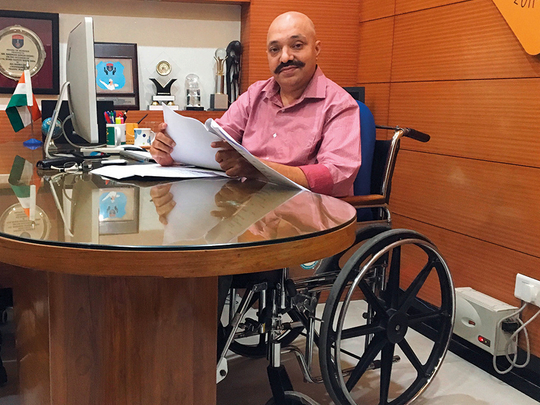
New Delhi: The Supreme Court’s directive to ban sale and serving of liquor within 500 metres from highways, implemented from April 1, has taken the fizz out of millions of bars and liquor vendors on state and national highways across the country.
The court judgement mentions that liquor outlets situated within local bodies where the population is less than 20,000, can operate beyond 220 metres and in areas with a population of more than 20,000, will have to abide by the rule of 500 metres.
The man behind this move is Harman Singh Sidhu, a Chandigarh, Punjab-based activist. Forty-seven-year-old Sidhu says: “We all come into this world with a purpose. I suppose mine is to create awareness among people about road safety.”
His journey towards this mission took roots in 2005. But what triggered it happened much earlier. Sidhu reminiscences: “In 1996, along with three friends, I was returning to Chandigarh from Himachal Pradesh. Honestly, we were not drunk. It was my sheer misfortune that our vehicle suddenly skidded and rolled down the hill. While all my friends came out safely, I could not move.”
Sidhu had suffered a spinal injury paralysing him from neck down and rendering him wheelchair-bound at the age of 26. His treatment at the PGI, Chandigarh continued for over two years. “There, observing that most injured persons brought to the emergency ward were victims of drunken driving, I began contemplating working for the good of the nation,” he says.
With his own life having come to a standstill, initially, it was difficult for him to come to terms with the stark reality, but Sidhu’s never-say-die attitude forced him to make the best choices. “I learnt website designing, which continues to be my source of livelihood. And along with that, in 2005, I launched an NGO, ArriveSafe, which led several road safety awareness campaigns in association with World Health Organisation and the United Nations.”
Sidhu did a lot of ground work and undertook many surveys. Going through excise policies of different states he noted the pattern of road accidents. “We noticed that a large number of people were dying in accidents caused by drunken driving,” he notifies.
Before he began his campaign against liquor vending adjoining highways, he sought data from the National Highways Authority of India through the Right To Information (RTI) Act, and was startled to find that on a 291km stretch of National Highway 1 — from Panipat (Haryana) to Jalandhar (Punjab) alone, there were 185 liquor outlets. This meant a liquor shop at every 1.5km.
The activist said, “At that point, I decided to file a Public Interest Litigation (PIL) mentioning that a driver should not be tempted to buy alcohol.” Fighting the case since 2012, Sidhu finally got the Supreme Court order in his favour.
But, from pub sellers running online petitions to ‘save nightlife’ to states ‘de-notifying’ roads in a bid to save liquor vendors, all methods to find loopholes in the court orders is being tried and tested. Sidhu says, “It is very unfortunate. Except India, no country in the world allows selling of liquor on highways. It would have been better, if going by the Constitution, people had approached the Supreme Court and sought amendments. What kind of example are we setting by de-notifying roads?
“My effort is to control the sale of alcohol at places which endanger the lives of people. Any sane person will understand that people drink and drive for sheer excitement. And those who escape without an accident continue to commit the same mistake, risking their own lives and that of others. Despite nearly 40 per cent of road accidents happening because of drunken driving, liquor has continued to be available to people easily.”
So, what about states declaring they could lose Rs. 70 billion annually due to the ban? Sidhu answers, “Going by this, we should presume that the only revenue-earning option left to the states is through sales of liquor! This is highly alarming for our country?”
What about traders claiming the Supreme Court order will boost illicit liquor trade? Sidhu retorts, “Illicit liquor trade has been on forever. It was always a matter to be tackled by the enforcement agencies. It amounts to saying, ‘If drugs continue to be sold illegally, let us legalise them!”
Even while there’s nationwide hue-and-cry over the ban, Sidhu is calmly getting on with his other plans. He has written a comprehensive handbook, ‘Road Safety Manual’ on the rules of the road that addresses all classes of road users. He has also launched his next campaign.
“Last year, a school bus had plunged into a drain in a village in Amritsar. The bridge over the drain had no railings. Being driven at high speed, the bus went straight into the drain, resulting in the death of seven children and grievously injuring 20,” he informs.
It prompted Sidhu to carry out surveys of bridges and he discovered 100 bridges without railings. He has filed a PIL in the Supreme Court to rectify that.
Drinking and driving
• In India, one person dies every four minutes due to road accidents, which is the highest in the world.
• More than 147,000 people died in road accidents in 2015 — nearly 40 per cent because of drunken driving.
• The Motor Vehicles Act has been made more stringent and the drunk-driving penalty now is Rs. 10,000.
• If it results in the death of a person, the driver can be booked for a non-bailable offence with imprisonment of up to 10 years.












